









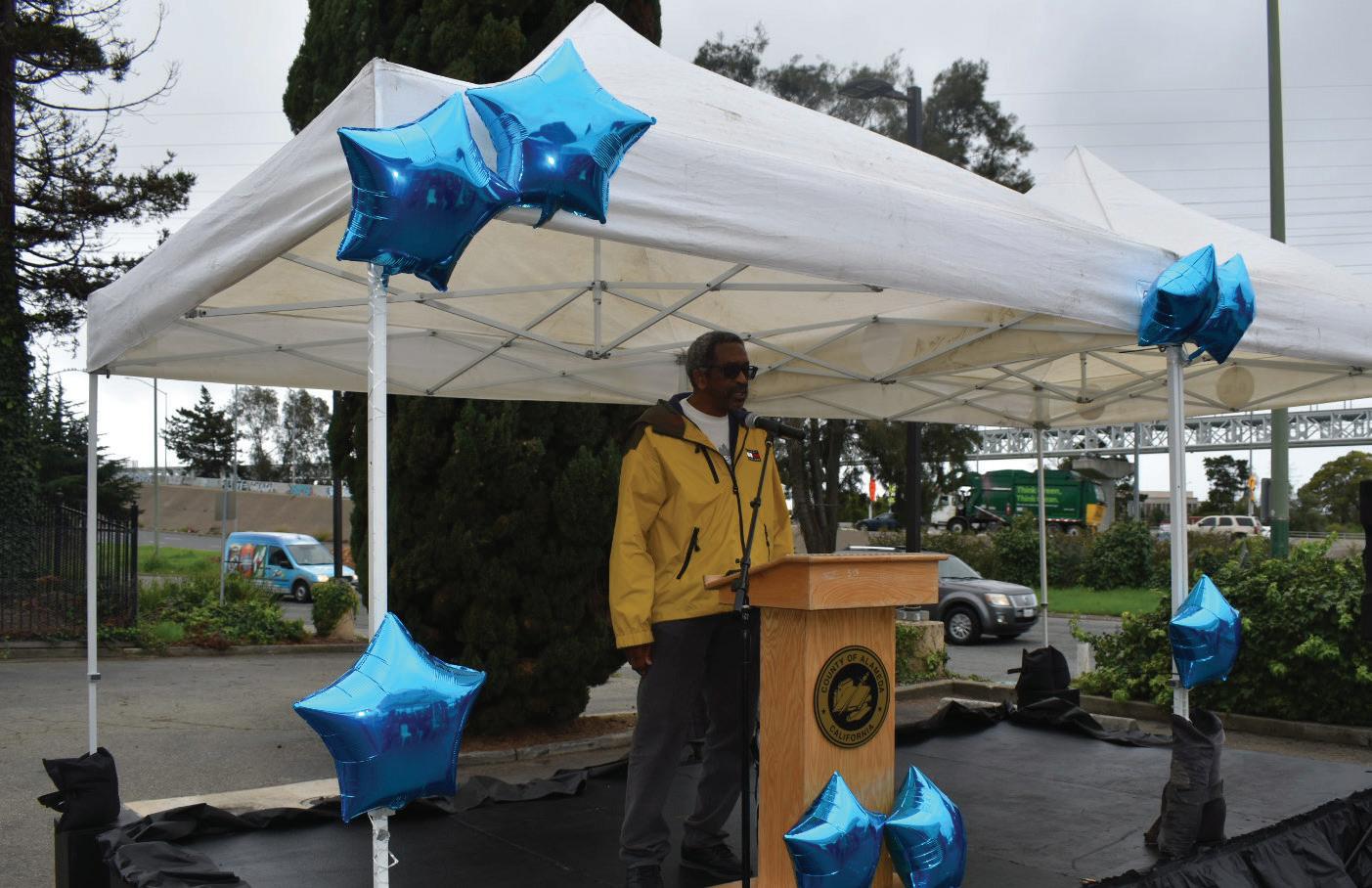 By Magaly Muñoz
By Magaly Muñoz
OakDays, a homeless shelter near Oakland International Airport, was recently approved by the Alameda County Board of Supervisors to be converted into permanent supportive housing for previously homeless residents and residents with severe medical needs.
The county first acquired the old motel space in the fall of 2020 during the rise of the pandemic. Funding was provided through Project
Roomkey, a state response strategy that provided non-congregate shelter options, such as hotels and motels, for people experiencing homelessness, to protect human life and minimize strain on the healthcare system.
The project will be funded through Alameda County Measure A1, which provides $18.6 million to increase funding for affordable housing county-wide. State Homekey is allocating $15 million. The
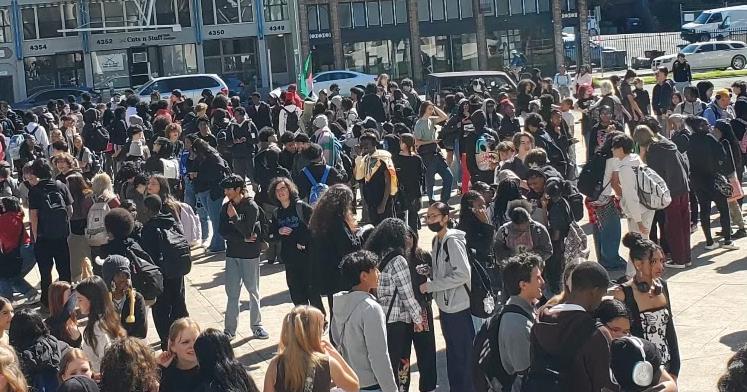


Alfreda Helen Abbott (“Snookie”) passed away at the age of 92 on March 2, at her home in the Oakland hills surrounded by her family.
She was born March 8, 1931 and reared in West Oakland as the only child of Fred and Alberta Lester.
Alfreda graduated from Oakland
High in 1949 and went on to receive her Bachelor of Arts degree from the University of California at Berkeley.
Shortly after completing her degree, she married the intelligent and charismatic Robert P. Abbott on June 6, 1954. The couple were married for 56 years until his passing in 2010.
Alfreda traveled extensively and has visited six continents. She had many interests in life and some of her passions included her family, fine dining, caring for her plants, and public service. A “foodie,” Alfreda enjoyed trying new restaurants along with regularly dining at her favorites. She was always current on the newest spots.
Alfreda’s professional life
By Ken EpsteinThe
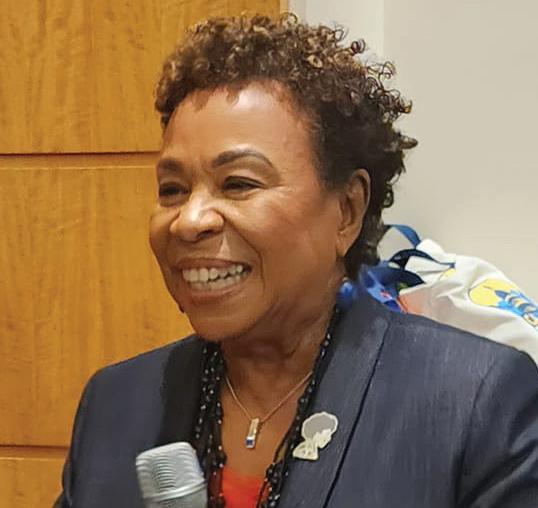 By Post Staff
By Post Staff
“The Black Student Union condemns the censoring of free speech and suppression of political activism,” according to a statement on social media.
A press conference was held at Westlake, 2629 Harrison St. in Oak-
two competitors in the primary and special election for U.S. Senator for California on Tuesday, Congresswoman Barbara Lee released the following statement on Wednesday:
“I want to thank all my supporters and all of the volunteers who made calls, knocked on doors, and did amazing work on the ground to reach communities across the state. Our voices and values were heard loud and clear: Californians deserve a living wage, an economy that works for everyone, housing and healthcare as human rights,
By Post StaffThe law firm representing Alameda County District Attorney Pamela Price has submitted a letter to the county’s Registrar of Voters demanding the registrar and county officials comply with requirements of the Alameda County Charter when reviewing the petition that was submitted this week to put the recall of D.A. Price on the November ballot.
The recall group, which began its campaign to unseat D.A. Price almost immediately after she took office in January of 2023, said on Monday it has submitted sufficient voters’ signatures to qualify for the ballot.
In a statement, the group claimed it has gathered at least 127,387 sig-
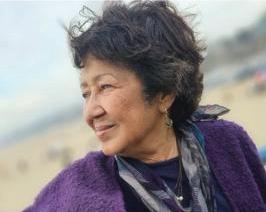
By
BarbaraBauer Susheel Bibbs dedicated 20 years to researching and presenting the life of Mary Ellen Pleasant, a Black woman, real estate mogul and financier regarded as the “Mother of Human Rights” in California (1814-1904).
Bibbs brings the culmination of her work to the African American Museum and Library at Oakland, 650 14th St., on March 9 at 2 p.m.. Bibbs, singer, producer, author, teacher and scholar, began singing in her kindergarten class in St. Louis, MO, when the teacher asked her to sing during nap time. In high school, she sang in the chorus and became the youngest Legend singer, a group whose repertoire centered on Spirituals, (The Legend Singers Chorale Ensemble).
Bibbs moved to California in 1980. She lived in San Francisco for 20 years, working many jobs, including teaching at U.C. Berkeley (1982-2010).
Bibbs, who studied with renowned vocal teachers, holds degrees from Boston University’s School for The Arts, the New England Conservatory of Music, and The Mozarteum in Austria. Her first concert recital was in1983; she toured in opera and concert presentations for over 30 years in the U.S. and abroad. Her awards include an
natures, considerably above the 73,195 valid signatures necessary to qualify for the fall election.
However, a March 5 letter from the Sutton Law Firm to Tim Dupuis of the Alameda County Registrar of Voters, the county Charter, section 62, “differs in several ways from the California Elections Code with respect to recall of local officials” and could invalidate many of the signatures.
Specifically, the County Charter requires that (1) only voters registered in Alameda County are permitted to circulate the recall petition; (2) petition signers must list their occupation on the petition; and, the Registrar has 10 days after submission to determine whether
Emmy and a commendation from Supervisors of the City and County of San Francisco for her contributions to the Arts, who named her “the world’s foremost authority on Mary Ellen Pleasant.” A PBS Arts Showcase profiled her nationally, and her work in TV and film led to 26 international awards. In 2012, Bibbs founded The Living Heritage Foundation to assist other artists.
Because Bibbs wanted to perform compositions “by my own people,” she researched Black composers and her first concert tour included a program of compositions exclusively by Black composers. She researched and produced programs that brought to life The Hyers Sisters (1855-1929): singers and pioneers of Black musical theater and Mary Ellen Pleasant (1814-1904), an abolitionist. Bibbs continues to shine a light on their lives, informing the world of their contributions.
Bibbs was resourceful. Once she became ill during a tour in Europe with what she thought was “bronchitis.” When she later found out her sickness actually resulted from an allergy to the sulfates in wine, which was served daily in Europe, she packed her bags and shifted her focus.
“I returned to the U.S., called the founder of Zoom, a singer I had worked with, and he engaged me in a project.” Later, in 2005, after several surgeries, she shifted her focus to films and work with TV.
Bibbs wanted to sing and used every possible resource to fulfill her dream. Her Art was a springboard.
Bibbs continues her work from her home in Sacramento. Her mantra: “When one door closes, look in the mirror and open another.”
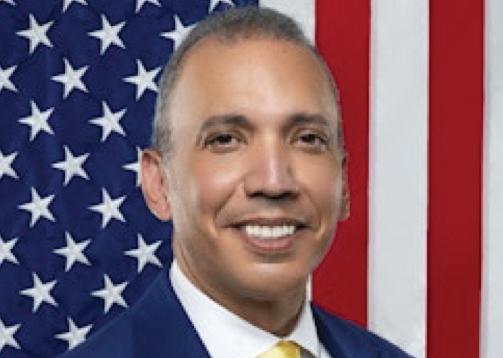
 By Magaly Muñoz
By Magaly Muñoz
The Oakland Police Commission hosted a public forum on Feb. 29 at City Hall for the new slate of candidates in the running for Oakland police chief.
The candidates are New York City Assistant Deputy Mayor Louis Molina; Cincinnati Assistant Police Chief Lisa Davis; former San Leandro Police Chief Abdul Pridgen; and former Lubbock, Texas, Police Chief Floyd Mitchell.
This week, The Oakland Post will provide answers from Molina and Davis: Next week, we will provide the responses from Pridgen and Mitchell.
The candidates presented a plan for their first 100 days as police chief and were asked a series of questions about their role in the Oakland Police Department (OPD). Here are highlights from their answers: What is the plan for your first 100 days as police chief?
Molina will prioritize building community; review departmental
inner workings including budgets, hiring processes and policies; analyze data and reports to understand their impact on the community; and focus on crime prevention strategies and addressing mental health and substance abuse issues.
Davis will go on a ‘listening tour’ to engage with city leaders, members of the community and members of OPD to understand expectations, perceptions, and concerns; explore data-driven violence reduction strategies; and review OPD values, such as morale, recruitment, and retention.
Why does your background in policing make you the best fit for Oakland’s police chief? How will you use this experience?
Molina: The deputy assistant mayor shared that he has been involved in the ‘main pillars’ of the criminal justice system: policing, the district attorney’s office, and corrections in multiple local jurisdictions. He has worked with vulnerable communities, such as the homeless popu-
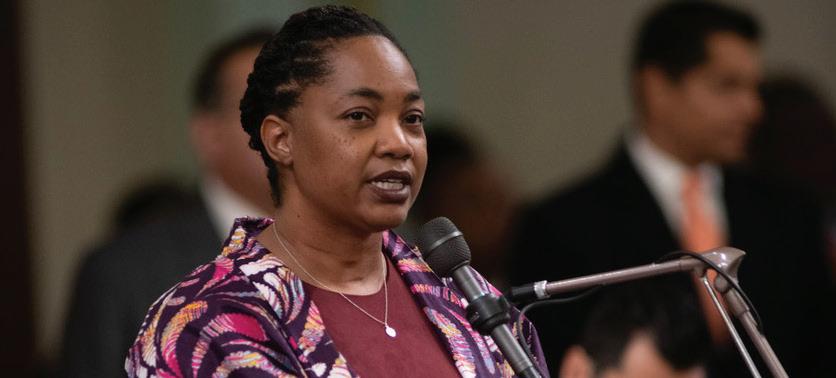
By Antonio Ray Harvey
California Black Media
The process the California Legislative Black Caucus (CLBC) promised to initiate to pass a package of reparations bills began Feb. 26, on the Assembly floor at the State Capitol with the passage of Assembly Concurrent Resolution (ACR) 135.
Authored by Assemblymember Akilah Weber (D-La Mesa), ACR 135 — or the “Human rights violations and crimes against humanity on African slaves and their descendants” — recognizes the “harms and atrocities committed by representatives of the State of California who promoted, facilitated, enforced and permitted the
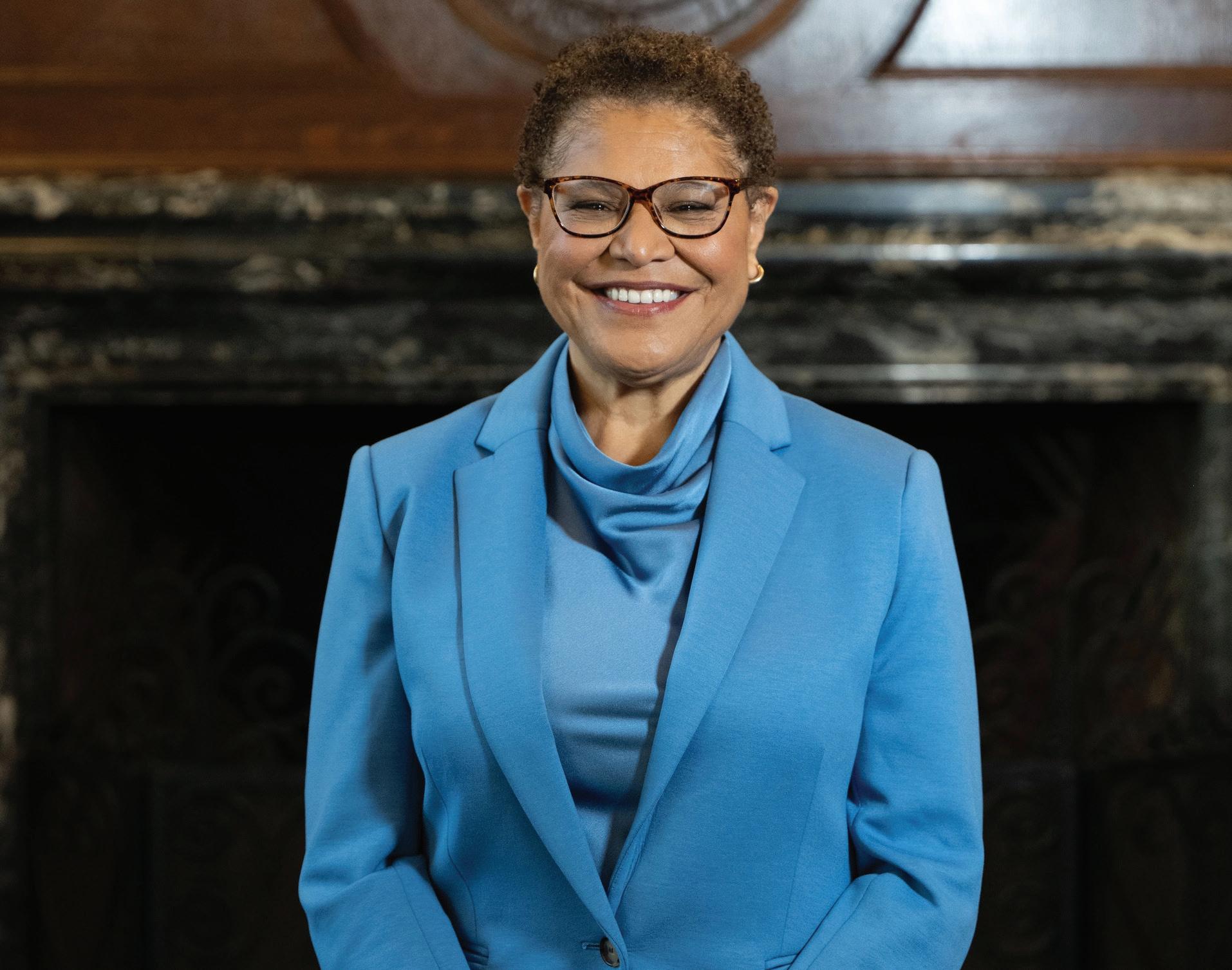 By California Black Media
By California Black Media
For the fifth time, political activists are attempting to recall Gov. Newsom.
Last week, prominent Democratic Party figures slammed this latest attempt by a conservative group called Rescue California, calling it a non-starter.
Los Angeles Mayor Karen Bass responded to the news, “We beat them last time, and we’ll beat them again,” before pointing out how Newsom’s leadership has benefitted California’s largest city.
“Governor Newsom has delivered countless times for Los Angeles over just the past year helping us address the homelessness crisis, rebuild after the 10-freeway fire and recover from recent storms,” said Bass in a statement.
“Republican recalls do nothing more than waste taxpayer dollars
and valuable time when we need to be prioritizing these important issues. This is the same group that tried to prevent Californians from getting vaccinated — they were wrong then for attempting to recall the Governor and are wrong now,” she added.
In a social media post on X, the platform formally known as Twitter, the Governor was confident.
“We will defeat them,” he posted.
California Democratic Party Chairman Rusty Hicks labeled the recall effort “the California Coup.”
“Some of the same individuals and groups who were encouraged by California Republican leaders and who attacked the people’s house are also engaged in a recall effort against Governor Gavin Newsom right here in California,” Hicks said in a statement.
This is the second time Rescue
California has attempted to recall Newsom. The group’s last failed attempt was in 2021.
Last week, Newsom’s office also responded to a Bloomberg News report that he has exempted Panera Bread from California’s fast food minimum wage increase that is scheduled to take effect April 1. According to the story, Newsom excluded Panera Bread because of his ties to Panera Bread franchisee and Democratic Party donor Glenn Flynn.
Under the law, the fast-food restaurants will have to pay workers $20 an hour, up from $16.
Newsom’s. Office called the allegations “absurd” and clarified that, to be exempted from the minimum wage hike, a restaurant would have to produce bread for sale on site, which Panera Bread does not do.


By California Black Media
On Feb. 26, Assemblymember Corey Jackson (D-Moreno Valley), a member of the California Legislative Black Caucus (CLBC), co-chaired an informational hearing on the escalating severity of California’s mental health crisis, and the challenges that prevent health care professionals from adequately addressing it.
The discussion was a bicameral session led by the Assembly Select Committee on California’s Mental Health Crisis and the Senate Select Committee on Mental Health and Addiction.
The hearing, titled “What’s Working and What’s Coming: Opportunities in Addressing California’s Mental Health Crisis” was led by Jackson and Sen. Scott Weiner (D-San Francisco), the two
committee chairs.
One of the issues the hearing focused on was the shortage of mental health professionals in the state, particularly in inland regions.
Jackson said the Legislature will take a fresh approach to evaluating mental health policies. After implementing them, he says, members will continue to assess the rollout and impact of the policy and make corrections when and if necessary.
“Just because we have made some historic decisions when it comes to our mental health system, that doesn’t mean it is the end of the discussion. It means that we still have work to do,” said Jackson in his opening statement.
“Our work will not stop until that population is stabilized and
they are receiving quality and timely services that meet their individual needs,” Jackson added.
During the two-hour session that included time for public comment, a number of policy experts and medical practitioners, including a paramedic, spoke about “progress on workforce development” and “community engagement.”
Among other issues, the testimonies touched on shortcomings of existing mental health programs, resources practitioners need to improve patient treatment, shortages in the public health workforce and how the race, ethnicity and languages of the current workforce do not match the increasing diversity of California’s population.
By California Black Media
Closing out a month of Black History Month events, the California Legislative Black Caucus (CLBC) honored 12 Californians with its “Unsung Hero” award during a ceremony held at the State Capitol on Feb. 26.
The awards recognize individuals who have made significant contributions to civic life within each CLBC member’s district.
Assemblymember Reggie Jones-Sawyer (D-Los Angeles) presided over the ceremony and presented a resolution on the Assembly floor celebrating the extraordinary work the award recipients are doing in their respective communities.
“The CLBC created the Unsung Hero Awards in honor of Dr. Martin Luther King Jr. – to celebrate those who embody his philosophy and ideas,” said Jones-Sawyer, a member of CLBC. “We continue this tra-
dition with this distinguished group of individuals.”
This list of honorees included city of Fairfield librarian Mychael Threats (Assemblymember Lori Wilson, D-Suisun City), Treehouse’s CEO and founder of Prophet Walker (Assemblymember Isaac Bryan, D- Ladera Heights), Young and Prosper Foundation’s Chris Jones (Assemblymember Akilah Weber, D-La Mesa), Oakland African American Chamber of Commerce’s President Kathy Adams (Assemblymember Mia Bonta, D-Alameda), and Los Angeles Unified School District’s Government Affairs advisor Carolyn Fowler (Assemblymember Tina McKinnor, D-Inglewood).
Awards were also given to Brother 2 Brother At-risk Mentoring and Gang Prevention’s co-founder Mervin Brookins (Assemblymember Kevin McCarty, D-Sacramento), KBLA Radio 1580 talk show Host Dominique
DiPrima (Reggie Jones Sawyer, D-Los Angeles)), California Justice and member of the California Supreme Court Leondra R. Kruger (Assemblymember Chris Holden, D-Pasadena), Vice Chair of Compton Unified School District’s Board of Education Dr. Ayanna Davis (Assemblymember Mike Gipson, D-Carson), and Moreno Valley youth advocate Kymberly Taylor (Assemblymember Corey Jackson, D-Moreno Valley).
On the Senate side, Dr. Thomas Parham, the 11th President of California State University Dominguez Hills, was honored (Sen. Steven Bradford, D-Inglewood). His wife Davida Parham accepted the award on his behalf. Fran Jemmott, founder of California Black Women’s Health Project and the Jemmott Rollins Group, was escorted to the Assembly floor for her award by Assemblymember Bryan, who stood in for Sen. Lola SmallwoodCuevas (D-Los Angeles).


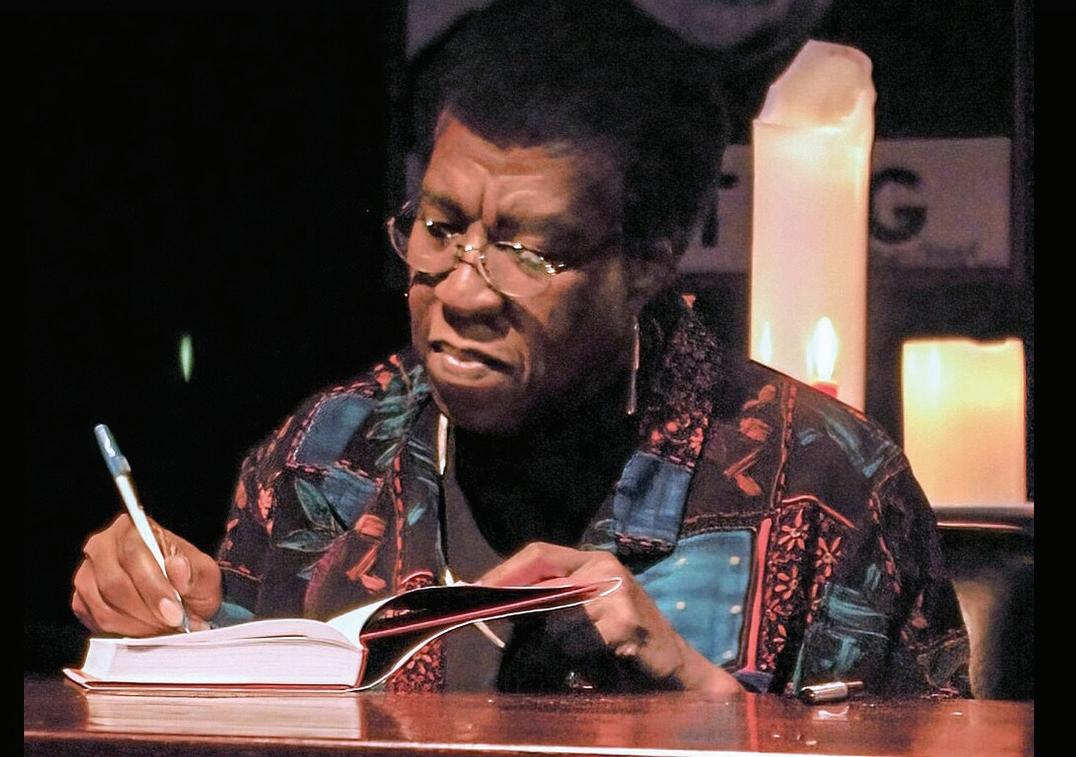 By Tamara Shiloh
By Tamara Shiloh
Octavia Butler, an esteemed figure in the realm of speculative fiction, stands as a luminary whose works transcend mere storytelling, delving deep into the complexities of identity, power, and societal structures. Born on June 22, 1947, in Pasadena, California, Butler’s journey from a young, aspiring writer to a celebrated author has left her mark on literature, particularly in the genre of Afrofuturism.
Her early life was marked by challenges, as she navigated through the complexities of being an African American woman in a society packed with systemic barriers. She found solace in libraries, devouring science fiction stories despite the lack of representation of people who looked like her. These experiences fueled her desire to fill this void and tell stories that reflected the diversity of human experiences.
In 1976, she published her first novel, “Patternmaster,” marking the beginning of a remarkable literary career. With each subsequent work, including the “Patternist”
series and the critically acclaimed “Kindred,” she established herself as a visionary storyteller, blending elements of science fiction, speculative fiction, and social commentary to create rich, deep narratives.
One of Butler’s most enduring themes is the exploration of identity and power dynamics. In works like “Parable of the Sower” and “Parable of the Talents,” she examines issues of race, gender, and class within the context of dystopian societies. Her protagonists, often marginalized individuals, navigate these oppressive systems while striving for autonomy and self-determination.
Her contribution to Afrofuturism, a cultural visual that combines elements of science fiction, fantasy, and African diasporic culture, cannot be overstated. Through her storytelling, she challenged the Eurocentric narratives that dominated speculative fiction, offering a fresh perspective rooted in the experiences of Black people.
Octavia E. Butler’s awardwinning novel ‘Parable of the Sower’ is one of her many books
that has been given the green light to be made into a film. As of July of 2021, the book’s concept had already been carried into the production studio and developed thanks to A24 studios.
It’s also rumored that ‘Fledgling’ is another book by Octavia E. Butler which is currently being developed as a test trial by HBO. The entertainment big dog brought on board as executive producers J.J. Abrams and Issa Rae for the making of Butler’s vampire novel on a pilot basis.
Her 1979 novel book ‘Kindred’ is an American science fiction television series that premiered with eight episodes on Dec. 13, 2022, on FX on Hulu.
Octavia Butler’s influence extends far beyond the realm of literature. Her persistent portrayal of social issues and her commitment to diversity and inclusion have inspired generations of writers and activists. She remains a towering figure in the field of speculative fiction, revered for her visionary storytelling and unwavering dedication to amplifying marginalized voices.
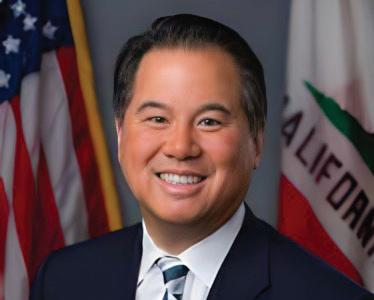
Last year, when the Supreme Court of the United States (SCOTUS) banned the consideration of race in college admissions, some members of the California Legislative Black Caucus (CLBC) and
other lawmakers condemned that decision.
Last week, Assemblymember Phil Ting (D-San Francisco) introduced a bill, Assembly Bill (AB) 1780, that he says is a policy response to the SCOTUS’s ban on
Affirmative Action.
AB 1780 aims to prohibit private colleges and universities in the state from granting preferential treatment to applicants who are related to donors or alumni, if the institution receives CalGrant funding.
“The practice is commonly known as ‘legacy admissions’ heavily tips the scales towards someone related to a donor or alumni of the university or college. The legislation aims to level the playing field by giving all students a fairer shot when applying to schools,” read a press release from Ting’s office.
“We want to make sure that every student applying to the most elite schools in our state has an opportunity and that it’s fair and equitable,” said Ting at a Sacramento rally where he announced the legislation.
Ting says California’s statefunded institutions do not consider income provide preferential treatment to children or relatives of donors and alumni.


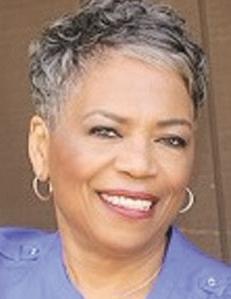

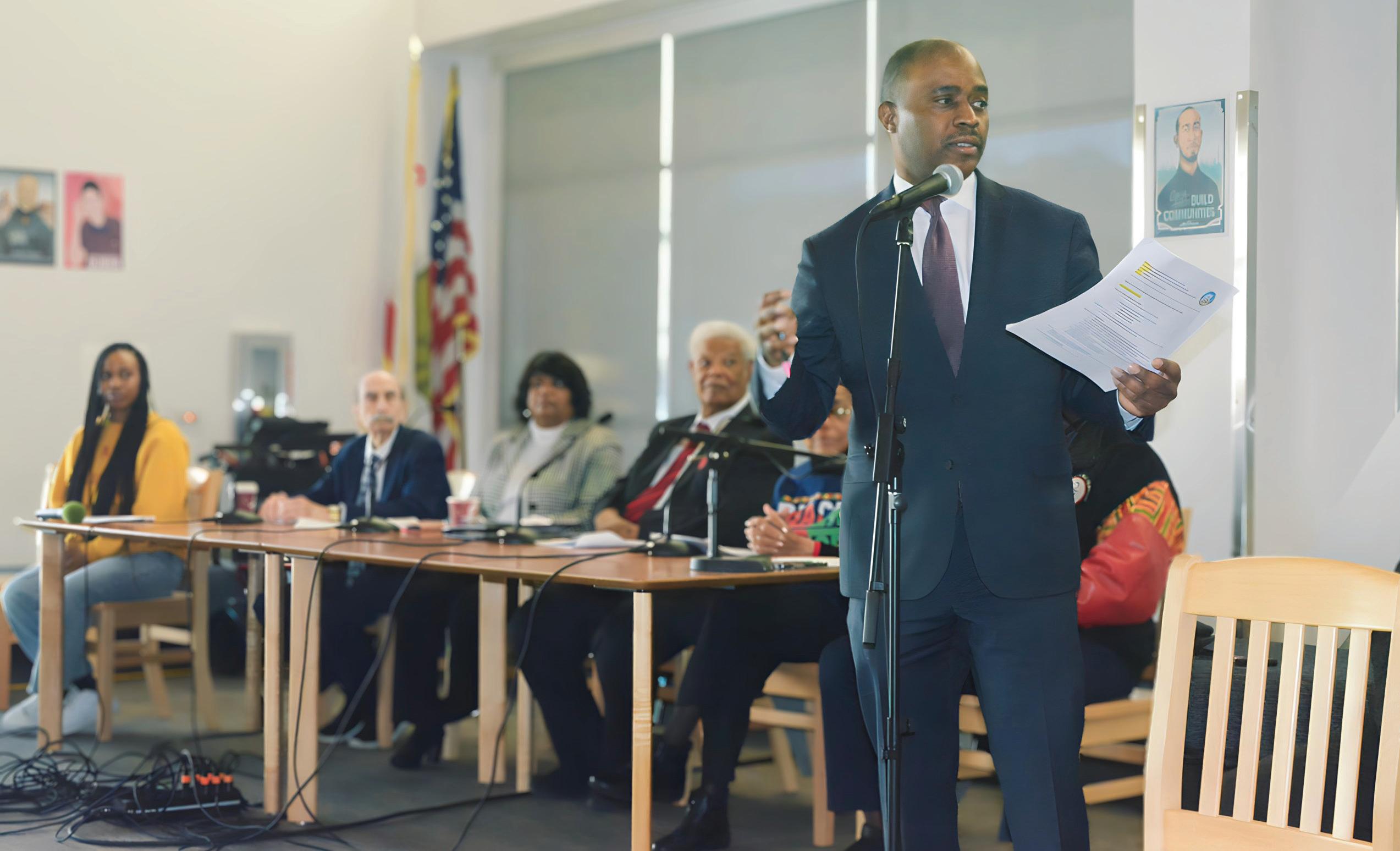 By Antonio Ray Harvey
By Antonio Ray Harvey
California Black Media
California State Superintendent of Public Instruction (SSPI) hosted an oral history presentation for Black History Month at DeAnza High School in the Contra Costa County city of Richmond.
In front of a diverse group of public officials, guests and students from five other campuses within the West Contra Costa Unified School District — attending in person and by ZOOM — panelists shared their experiences of Black life in the city 16 miles northeast of San Francisco.
“I am a believer that the best history is living history and today you have an opportunity to hear from many who have made history in this community,” Thurmond told the students. “They are incredible leaders who have watched this city and how it has grown, evolved, and changed.”
An educator, social worker, and public-school parent, Superintendent Thurmond served on the Richmond City Council, the West Contra Costa Unified School Board, and in the California State Assembly representing District 15 before he was elected SSPI in 2018.
At the Black History Month event,
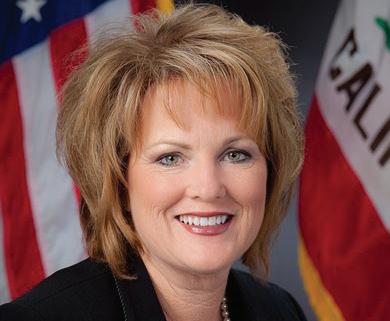
ficking of children from a misdemeanor to a felony.
criminals
child
Building upon that premise, last week Grove introduced Senate Bill (SB) 1414 which would impose longer sentences on individuals convicted of soliciting or purchasing sex with children.
“With the introduction of SB 1414 we are going after the buyers, those who are purchasing sex from children. Together, we are sending a clear message - not one more child,” Grove posted on Facebook.
Last year, Grove introduced SB 14, a bill that reclassified sex traf-
“I’ve had district attorneys from across the state say that this law has allowed them to prosecute these traffickers,” Grove said, referencing SB 14. Grove contends that the penalties on the books for solicitation and sex trafficking of minors are too lenient.
“Under existing law, a person who solicits, or who agrees to engage in, or who engages in, any act of prostitution with the intent to receive compensation, money, or anything of value from another person is guilty of disorderly conduct, a misdemeanor,” the language in SB 1414 reads.
Thurmond introduced several community elders who have made significant contributions to the city of Richmond.
Those special guests included
Nathaniel “Nat” Bates, eight-time Richmond City Council member; Audrey Miles, former West Contra Costa Unified School District Board President, the first Black woman elected to that role; and Myrtle Braxton, former Chair of the Richmond Parks and Recreation Commission and former member of the National Parks and Recreation Commission.
John Marquez, Contra Costa College board member and former Richmond City Council member for 18 years; and Ahmad Anderson – son of former Richmond Mayor Irma Anderson and member of the Cal Berkeley Football Hall of Fame – were also panelists who spoke during the 90-minute discussion that ended with a question-and-answer segment.
A brief video tribute was paid to Irma Anderson during the presentation. Anderson was the first Black woman elected as City Council member and Mayor of Richmond. Incorporated on Aug. 7, 1905, and instituted as a charter city on March 24, 1909, the city of Richmond had

The California Employment Department (EDD) has announced that it will stop issuing benefit payments on Bank of America (BOA) Debit cards.
Instead, the EDD has already begun to pay people who receive unemployment payments as well as disability and family leave benefits on using Money Network prepaid debit cards.
The EDD says people receiving those benefits should expect the new cards in the mail, and that they can take up to14 days from the date they qualify to when they receive them.
“Through our partnership with Money Network, we are enhancing how we deliver benefits to our customers,” said EDD Director Nancy Farias. “That includes in-
troducing a direct deposit option later this year – the fastest, most secure method for receiving payments.”
April 15 will be the last day that BOA debit cards can be used. The EDD is urging customers to use all the money on those cards or submit a request to BOA to receive a check with their balances.
According to the EDD, it will also implement a direct deposit option later this year.
“This service improvement is part of EDDNext, a multi-year transformation effort to improve the EDD customer experience –updating technologies and selfservice choices, streamlining forms and notices, and enhancing staff efficiency through updated policies and procedures,” the EDD announced.
a population of 115,677 residents in 2021, according to the City of Richmond Community Development Department. The Black or African American community makes up 19.1% of the city’s population. The largest ethnic population in Richmond is Hispanic or Latinos at 44.6%, followed by Whites at 20.1% and Asians at 14.4%.
Between 1940 and 1945, tens of thousands of workers from all over the country moved to Richmond to support shipyard industries during World War II. Nat Bates told the students he was part of that “great migration westward” as many African Americans from the Deep South states were seeking opportunities.
Richmond has had 21 Black elected officials between 1961 and 2023. The panel encouraged the students to learn more about Black history, and the background of Richmond, and get involved in government at the city, county, state, and federal levels.
“Open your hearts, open the doors, and some of you may well be a U.S. Senator, a governor, a professor, or maybe the President of the United States,” Bates said.

The California Forestry Association held its annual conference on Feb. 26-27 at the Kimpton Hotel in Sacramento.
A key highlight was a conversation with Randy Moore, the 20th Chief of the U.S. Department of Agriculture’s Forest Service. Managing over 193 million acres of national forests and grasslands, Moore leads a workforce of over 31,000 employees dedicated to sustainable forestry practices.
Moore emphasized the critical role of collaboration and knowledge-sharing in managing the nation’s woodlands.
“As stewards of our nation’s precious woodlands, collaboration and knowledge-sharing are paramount. Participating in Calforests’ annual conference provides a vital platform for dialogue, where
we can align efforts, exchange insights, and advance sustainable forestry practices,” he said.
The discussions at the conference facilitated alignment of efforts among stakeholders, and exchange of insights to advance sustainable forestry practices.
Chief Moore also expressed gratitude for the opportunity to broaden the forestry sector’s reach to traditionally underrepresented communities in California.
“Together, we can strengthen our resolve to safeguard forests for future generations. Moreover, this conference serves as a vital platform to broaden the audiences and reach of the forestry sector to the state’s traditionally underrepresented communities, ensuring that all Californians know that they have a stake in our collective mission of forest conservation and management,” Moore added.
Birthday of Dr. Rosemary Darden
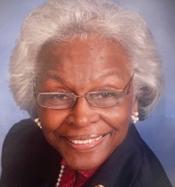 By Gary Flaxman
By Gary Flaxman
On March 7, Oakland celebrated the 90th birthday of Dr. Rosemary Darden, a respected teacher, advocate and benefactor.
Darden was born in 1934 in Mobile, Ala., home of the first annual Mardi Gras celebration.
Growing up in that Gulf coast city, Darden, who was a majorette, learned the value of service and community, and she developed an abiding appreciation for the traditions of her hometown. She still returns to Mobile for Mardi Gras celebrations.
At 14, Darden moved to Oakland with her father, a man she adored. She soon adapted to the ways of a big city, walking to school with future NBA star Bill Russell, earning top grades, and spending time engaged in activities at DeFremery Park, where she would hang out with other wouldbe local and national luminaries like baseball great Curt Flood and Bill Clinton administration Secretary of Commerce Ron Dellums, among others.
After graduation in 1951, Darden enrolled at San Francisco City College, where she would meet future Mayors Booker T. Anderson and Willie Brown. While working part time at Metropolitan Insurance, Darden would later become the first Black faculty administrator. Her first teaching job, which would become her lifelong passion and expertise, was at UC Berkeley’s school for young children.
Darden left college after two years to get married. Her partnership with her husband produced four children.
Later, she returned to graduate school full time and earned a
master’s with honors and teaching credentials. Her good grades, however, created problems for her when an administrator could not believe she had accomplished so much in so little time.
After graduate school, Darden became an educator and enjoyed nearly a decade as a SFCC dean, before being invited to become Dean of Science and Technology at Sonoma State Univesity.
After being invited by a volunteer recruiter to select a nonprofit, Darden. decided to join the board at Goodwill industries. Following a San Francisco visit by the East Coast head of Goodwill, she was nominated for the national Goodwill board, traveling to Washington for four annual meetings. Rosemary never intended to be (president) of Goodwill industries. Circumstances during the George Bush administration elevated her to that position, as she was nearing the end of her six y]ear term when former Senator Fred Mindy of 1980’s Television Love Boat Fame, invited her to join the international board at Goodwill.
When invited to join a foster care organization at San Francisco, she suggested a fundraising luncheon to raise funds and to publicize the some of the problems foster kids face.
Darden asked former Sen. Diane Feinstein to introduce San Francisco symphony hall philanthropist Louise Davies at the event, which made it a must-attend event and a huge financial success, attracting the city’s generous top philanthropists. Darden cherished her work being benefactor and beneficiary, as well as mother to her four children and grandchildren.
The Peralta Community College District (PCCD) is seeking proposals from community-based health providers to provide Health Center Clinic Services, (RFP No. 23-24/14), Districtwide. Proposals are to be submitted electronically (via Vendor Registry), by 3:00 P.M. on March 27, 2024
The primary purpose of this project (“Project”) is to improve the health and educational success, address health inequity, provide trauma-informed care, and improve access to medical services for PCCD Students. This will be accomplished through the implementation of a School Based Health Center (SBHC) located on PCCD’s Laney College campus in Oakland, which will offer health promotion, the delivery of medical, health education and information, coordination with community-based primary care, and referral beyond the services provided by the SBHC staff.
There is NO Pre-proposal meeting for this project. Copies of the proposal documents may be obtained by clicking on the following link: https://build.peralta.edu/vendorregistry
Governing Codes:
GC 53068
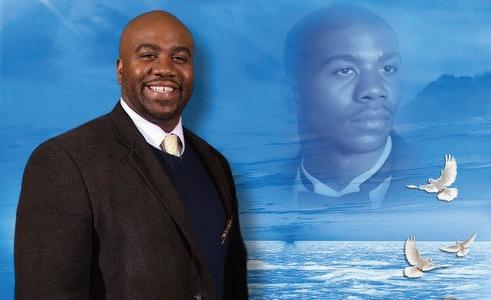
A beloved Oakland educator, Earl N. Crawford, Jr. was born on June 5, 1981, and passed away on Feb. 4. We are devastated by his loss and anxious to share his legacy.
Earl had a passion for knowledge that led him to earn a full scholarship at Holy Names University, where he double majored in English and Communications. During his time there, he discovered a love for teaching.
Driven by his desire to make a difference, Earl pursued a Master’s in Education and Single Subject English Credential. He worked tirelessly as an instructional assistant at Raskob Day School and later as a full-time English teacher at Castlemont High School.
His dedication caught the attention of Dewey Academy, where he served as Assistant Principal for four and a half years. Most recently Earl served as the principal/director of independent studies programs, and court schools for the Alameda County Office of Education’s community schools.
He gave his love, his patience, and his deep academic knowledge to young people. Monica Vaughan, ACOE chief of schools, says, “Mr. C. was a healer and teacher by nature. He always referred to himself
By California Black Media
During a rally held at the State Capitol in Sacramento on Feb. 26, State Superintendent of Public Instruction Tony Thurmond announced his support for Assembly Bill (AB) 2901, or the Pregnancy Leave for Educators Act.
At the rally, Thurmond was joined by the California Teachers Association, other fellow advocates and elected officials who support the legislation, which was authored by Assemblymember Cecilia Aguiar-Curry (D-Davis).
“Teachers must be able to afford to stay in the profession and start a family. By providing paid pregnancy leave for California’s teachers, we will take an important step toward achieving gender equity in teacher pay, and we will also make critical strides toward retaining great teachers to address the staffing crisis in California’s classrooms,” Thurmond said.
According to the bill’s language, SB 2901 would require public schools and community college districts in California to “provide up to 14 weeks of a leave of absence with full pay for an employee who is required to be absent from duty because of pregnancy, miscarriage, childbirth, termination of pregnancy or recovery from those conditions.”
SB 2901 was co-authored by the Legislative Women’s Caucus, including Senator Maria Elena Durazo (D-Los Angeles) and Assemblymembers Mia Bonta (D-Alameda), Sabrina Cervantes (D-Corona), Liz Ortega (D-Hayward), Sharon Quirk-Silva (D-La Palma), and Pilar Schiavo (DSanta Clarita).
The bill is scheduled to be heard in committee for the first time on March 17.
as a Servant Leader and that is how he will be remembered.”
Earl pursued a doctorate at Fielding Graduate University, with a dissertation study on the experiences of Black men in advanced educational roles. He did innovative work and was loved by the other students.
His doctoral adviser, Kitty Kelly Epstein, said “Earl is one of the best students I have had. He had a great mind to match his great heart.” His doctoral degree will be awarded posthumously in July 2024.
Earl is survived by his wife, Perresha; children, Elias, Pearl, and Priscilla; sisters, Quianna Crawford Robins and Penelope Madere; his mother, Stephanie Neal, and his father, Dr. Earl N. Crawford, Sr.
Earl’s legacy will live on through the lives he touched, his dedication to education, and his unwavering commitment to making the world a better place. He will be deeply missed, and his impact on the world will forever be remembered.
Friends and family will share tributes and condolences on Saturday, March 9 at the San Leandro Senior Community Center, 13909 E. 14th St., San Leandro, CA 94578 around 12:30 p.m.

By California Black Media
On Feb. 27, the Weingart Foundation, a philanthropic organization that partners with and funds communities across Southern California to advance racial, social, and economic justice, named Dana Henry its first Director of Black Justice and Healing.
“Dana Henry is a dynamic and values-driven leader who brings extensive experience working directly with Black-led and serving nonprofit partners to address antiBlack racism,” said Joanna Jackson, interim president and C.E.O. of the Weingart Foundation.
In the role recently created by Weingart’s leadership, Henry will “work to address the generational
inequities and racism faced by the Black community in Southern California and support community-driven solutions for justice and healing,” according to a foundation press release.
Henry said, for her, the work is “deeply personal.”
“The generational harm that racist and unjust systems have caused families like mine serve as a reminder of just how critical it is that we come together to transform these systems and help communities heal. I look forward to building on the strides we’ve made, along with our nonprofit partners, to build opportunities for Black communities to thrive,” Henry said in a statement.

Continued from page 1
the petition contains sufficient signatures to be placed on the ballot.
“These County Charter provisions, which you are duty-bound to follow, take precedence over state law and must be complied with by (the Registrar), the Board of Supervisors, and other county officials,” according to the letter.
The Sutton Law firm letter disagreed with Alameda County Counsel’s legal opinion, which said that the county charter requirement that petition circulators be county residents is ‘unenforceable’ because of a U.S. Supreme Court decision in Buckley v. American Constitutional Law Foundation in 1999.
“Not only do we disagree with this conclusion on the grounds that Buckley, and all other cases analyzing such circulator requirements, involved initiative petitions rather than recalls, but County Counsel seems to ignore the explicit provisions of the California Constitution, which requires local agencies to enforce local laws unless and until a Court of Appeal rules that they are unconstitutional,” the Sutton letter said.
“Because no Court of Appeal has declared section 62’s circulator requirement to be unconstitutional,
your office has a legal duty to enforce it,” the letter continued. “Any petition signatures that were not gathered by Alameda County registered voters must not be counted as valid signatures.”
Further, “We also demand that any petition signatures that are not accompanied by an occupation not be counted as valid signatures,” the letter said. “Your office cannot choose to ignore this clear Charter requirement, or any other Charter requirement, just because state law does not require signers to indicate their occupations on petitions.”
Finally, the Charter requires petition signatures to be verified within 10 days from the filing of a petition. “We are well aware that you (the Registrar) indicated publicly that your office may not be able to verify the signatures within this time frame. The Charter does not, however, make any exceptions to the 10-day deadline,” but says the Registrar may need to hire additional personnel to review the signatures, the letter said.
The Sutton letter concludes: If the Registrar validates any signatures not in accordance with Alameda County Charter regulations, “Be advised that District Attorney Price intends to pursue all legal options to enforce County law.”
Continued from page 1
racial and economic equity, public safety for all communities, and just climate action.
“I was proud to run a grassroots, multicultural and multigenerational campaign that gave a voice to all those wanting to see true, progressive change. Despite being heavily outspent by my opponents, our values never wavered.
“In every step of this campaign, we never backed down from our progressive vision, and worked relentlessly to build a coalition that represents communities that too often are not afforded a seat at the table.
“We also sent a strong message on the urgency of calling for a permanent cease-fire and ending the humanitarian crisis in Gaza. Killing over 30,000 civilians is catastrophic, and it will never lead
to peace and security for the Israelis or the Palestinians. The United States needs to be a leader for a pathway to peace and security in the Middle East and around the world.
“As a Congressmember and a proud Californian, I will continue to deliver for my district and for California. I look forward to working with our people-powered coalition to push our elected leaders to take bold action on ending gun violence, climate justice, defending our reproductive freedom, fixing, and protecting our democracy and prioritizing the needs of working people—not big corporations or the wealthy.
“We will continue to mobilize voters throughout the state and demand action for a better California and not settle for half-measures.”
Continued from page 1
complemented her passion for civic and public service. She started her career as a deputy public officer for Alameda County and as a group counselor for the Social Service Bureau.
In the 1960s, Alfreda was actively involved in Oakland’s poverty program and was one of the original members of the Oakland Black Caucus.
She was one of 12 founding members for Black Women Organized for Political Action (BWOPA) where she served on the state board for many years.
For over 30 years Alfreda served as a trusted and highly respected Advisor and Field representative to the late Nicholas Petris, California’s longest-serving state senator.
After her retirement from Petris’ office, Alfreda returned to work as “chief of staff” for her dear friend Dezie Woods-Jones, who had been elected to the Oakland City Council
in the 1990s.
Among other distinctions, Alfreda was a former member of the Oakland Unified School District Board of Education where she was the second African American woman to be elected to that position.
Alfreda had a long history of community activism and has served on the Oakland Planning Commission, Board of Directors of the Museum Association, Bay Area Urban League, NAACP, Black Educators Association, California Democratic Party, Delta Sigma Theta sorority, and many other community organizations.
Alfreda leaves behind two wonderful sons, Ross Abbott and Brian Abbott, and one daughter-in-love, Carolyn Abbott. She also leaves to cherish her memory two goddaughters, Michelle Randle and Carla Kennedy, and a grandson, Kamal Kennedy along with a host of cousins.
Continued from page 1
land, before the walkout, and protesters rallied at the school board meeting Wednesday evening.
The walkout was sparked by the district’s decision to cancel permission for Bay Area Labor for Palestine to hold a teach-in on the Westlake campus on Sunday, Feb. 25 where members of more than 20 unions across the Bay Area were scheduled to hold a mass organizing meeting on Palestine.
However, on Saturday afternoon, the day before the event, “organizers got a phone call and an email from the Oakland Unified School District (OUSD) administration that their reservation had been canceled due to ‘staffing shortages,’” according to a press statement.
“The cancellation is certainly a politically motivated attempt to stifle Palestine solidarity organiz-
Continued from page 1
lation, aiming to provide resources rather than criminalizing them. He has experience lowering high crime rates, hiring diverse workers, and ensuring that justice comes first.
Davis: The assistant police chief said that she had negative and positive experiences with police growing up that made her realize that she wanted to join public service. She stated that her history matched with her passion for community insight, police legitimacy, and community policing is what makes her the best candidate.
How would you change the culture of the police department to ensure there is a culture of accountability from the top to the bottom?
Molina claims that he will ensure that everyone in OPD is invested in the department’s success. He will hold all entities to high standards and will issue discipline where necessary. He will provide support and training for those deviating from department processes. He is committed to making tough decisions when needed.
Davis believes Oakland has the resources to improve but needs strong leadership. She intends to stick to established policies and procedures set in the department and will ensure that leaders like police sergeants fully understand these policies because they interact directly with the officers.
As you implement constitutional
policing, how will you take into consideration the social conditions that give rise to criminality and often leads to over policing, especially of Black and Brown youth?
Molina believes that policing alone cannot solve every urban challenge. As police chief, he will work with other city agencies, such as the Mobile Assistance Community Responders of Oakland (MACRO) program, to divert non-violent cases toward public health solutions instead of criminalization. He stated that coming into a community or situation with an enforcement strategy mindset perpetuates the cycle of overburdening the criminal justice system when most cases can be solved through public health strategies.
Davis stated that poor neighborhoods require police attention and assistance. However, she points out that a few bad individuals in those locations does not mean that they should be given negative attention. She claimed that these neighborhoods actually want police presence, as long as they’re being treated fairly and justly. It’s about building community trust.
Thao received the Police Commission’s top candidate picks on March 1. The mayor can either reject the candidates once again and ask for a new set of names or pick one for the next police chief.
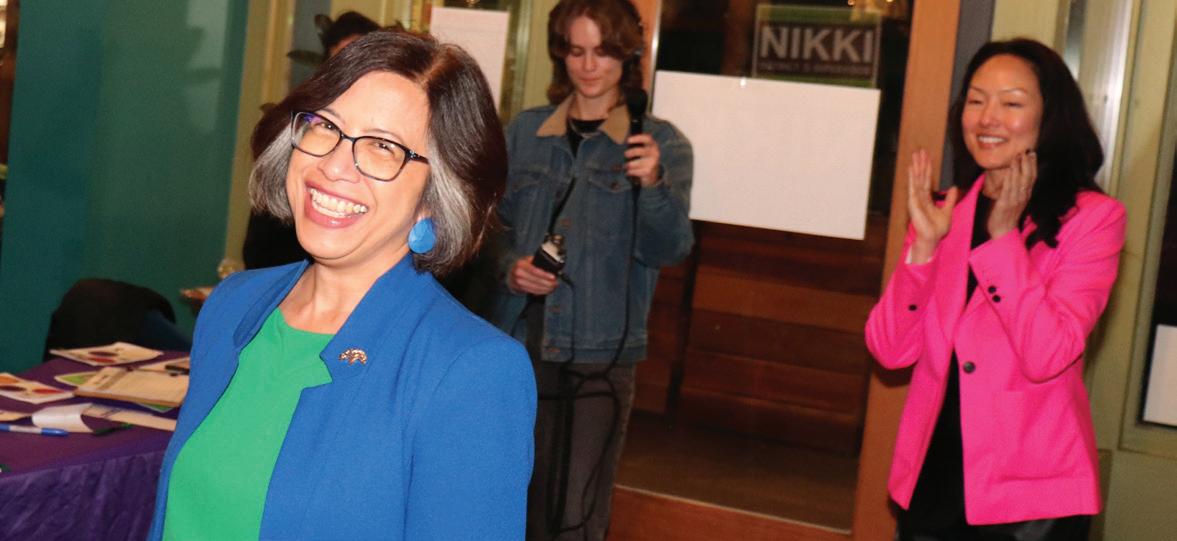 By Ken Epstein
By Ken Epstein
Nikki
FortunatoBas, Oakland City Council president and the Council’s District 2 representative, is running at the head of a large field of candidates in the wide-open race to fill the seat of District 5 Supervisor Keith Carson, who recently announced he was retiring after serving three decades on the Alameda County Board of Supervisors.
At press time, Bas was ahead with 28.3% of the vote and John Bauters in in second place with 19.52%, followed by seven other candidates, with thousands of mailin ballots remaining to be counted over the next few days.
The two top candidates will face each other in the November 2024 runoff.
Bas’s priorities as supervisor are the “three H’s: Homelessness, Housing, Healthcare,” according to her website. She said she is committed to providing “bold leadership to end homelessness, expand job creation, and establish comprehensive mental health/substance abuse programs, and transitional housing.”
Bas describes herself as a lifelong community organizer, nonprofit director, Filipina American, and working mom, “guided by her lived experiences as the daughter of immigrants whose struggles inspired” her progressive values, her website said.
She spent many years organizing Chinatown garment workers, building a student anti-sweatshop movement, and advocating for fair pay and working conditions for lowwage workers in the East Bay.
land with $350 million in affordable housing, about 2,400 affordable units, with some reserved for people who are currently unhoused.
“But we can’t just create housing,” she said. “We need the county to help us provide the services people need, such as health care, mental health care, and substance abuse support.
“For us to be successful, we need someone as a supervisor who understands the issues in Oakland deeply and help coordinate resources, so people receive the services they deserve,” Bas said. An important part of solving homelessness is “prevention,” she said. “The data shows that for every person that we are able to house, three more new people become homeless,” she said. “We have to make sure we have tenant protections, that we have rental assistance, including Section 8 vouchers, to support tenants and landlords to stay above water, to stop homelessness from growing like it has over the past few years.”
Bas is also concerned about conditions at the county’s Santa Rita Jail where there have been many in-custody deaths of inmates. She pointed to the death of Maurice Monk, a man who was arrested while experiencing a mental health crisis and died after being found unresponsive in his cell in 2021. His children will receive $7 million from Alameda County.
Continued from page 1
Metropolitan Transportation Commission is providing $2 million and Alameda County Yearly Operating is funding $3.6 million. The U.S. Department of Housing and Urban Development (HUD) has also awarded the project $2.5 million for annual operations costs.
Measure A1 has allowed for over 4,200 new affordable units to be created throughout the county.
“We want to make sure this is adding value, not just to the lives of the people that are here in the housing, but adding value to the broader community,” Alameda County Supervisor Nate Miley said.
Miley represents the area that the now-shelter resides in, along with Oakland City Councilmember Treva Reid, and shared that the county is actively exploring additional projects to expand housing options.
Oakland was recently awarded $20.3 million in state Homekey funds to build their own permanent housing project at a Quality Inn Motel in District 7. 77 units will be allocated for residents experiencing homelessness and the remaining 26 will serve transitional-aged youth.
While Project Roomkey allowed for temporary leased spaces for those isolating from COVID-19 and those experiencing homelessness, Project Homekey allows for cities and counties to buy and rebuild old spaces for permanent housing.
Jeannette Rodriguez, Deputy Director for Housing in Alameda County, revealed that 60 units will be specifically allocated for those in severe medical need and will allow for specialized, individual care by their partnership medical team at Cardea Health.
Rodriguez said that residents that are currently at the shelter receiving medical assistance are being offered the first chance to transition into the permanent housing through a lease agreement with rental subsidies.
The agreement is similar to the Section 8 Housing Voucher Pro-
gram, where tenants will only have to pay about 30% of their income towards rent, and selections for housing will be conducted through the county’s Coordinated Entry System.
“We believe housing is healthcare and look forward to the impact this sight will have on individuals in our community,” Rodriguez said. Services that will be available to residents include vocational, educational and employment assistance; housing stability support; health and dental services provided by Cardea Health; benefits acquisition; substance abuse support; mediation and family support; mental health services; and peer support, clinical case management and clinical case conferencing.
As the transition from shelter to permanent housing progresses, Five Keys Schools and Programs will continue to oversee the project.
Steve Good, President and CEO of Five Keys, stated that one of the silver linings of the pandemic was how much attention it drew to homelessness, mental health and substance abuse issues. Projects like OakDays give hope to those who didn’t know they had options and allows the most vulnerable to receive the help they deserve.
Good commended the project, and those similar to OakDays, for addressing the line between homelessness and health, stating that this will relieve the burden on the health care system because individuals who would often call 911 for every health scare, now have options for long term help through these investments.
Speakers at the event said that $8 million is saved every year in terms of health care utilization for residents at the shelter.
Construction at OakDays will begin this month and is set for completion in June 2025.
Continued from page 1
of chattel slavery,” according to the language of the resolution.
The measure was unanimously approved with a 57-0 vote on the Assembly floor. “ACR 135 is not only a resolution to affirm the (California Reparations Task Force) report,” Weber. Said during her presentation on the Assembly floor. “It is also meant to educate ourselves on California’s history.
The nine-member reparations task force submitted a comprehensive 1,075-page report to the Legislature on June 28, 2023. The report contains the panel’s findings from a two-year study that involved investigations of harms, testimonies from community members, and up to 115 recommendations for compensation for eligible Black Californians.
the rollout of the bills on Feb. 21, CLBC Chair, Assemblymember Lori Wilson (D-Suisun City), said the package was part of “30 reparations bills” the Black lawmakers are developing. A bill requesting a formal apology from the Governor and the Legislature for California’s historical injustices against African Americans is next in line, Wilson said.
The passage of ACR 135 will officially open discussions about reparations, Wilson said.
ing,” said Bay Area Labor for Palestine in the press release on Sunday. “OUSD claimed there were staffing shortages less than 24 hours before the event.”
OUSD did not return calls from the Oakland Post.
The attempt to stop the event was unsuccessful, according to organizers. Hundreds of labor activists met in the Westlake parking lot and at the nearby Oakland Peace Center.
The meeting was endorsed by the Oakland Education Association, United Educators of San Francisco (UESF), SEIU 1021, ILWU Local 10, UAW 2865 and UAW 5810, Palestinian Youth Movement (PYM), Arab Resource and Organizing Center (AROC), East Bay and San Francisco Democratic Socialists of America, and other political and community groups.
In an Oakland Post interview, Bas said she is running for supervisor because of the critical need for Alameda County to enhance its partnership with Oakland, so that together they can solve problems, rather than just put a dent in them.
“There are large-scale problems that Oakland and the county are working to solve, including homelessness, affordable housing, mental health care, and community safety,” she said.
“My experience on the council has been that we’ve been able to move so far in terms of addressing homelessness and housing, but at the same time we really need a strong partner in the county to support our most vulnerable residents, including Black residents who have been disproportionately impacted,” said Bas.
An important example, she said, is the bond measure, Measure U, which she helped place on the ballot in 2022, which is providing Oak-
“He should not have been put in jail where he died; he should have been put into some kind of mental health crisis stabilization project,” she said, adding that she supports an existing plan to “ensure there is oversight over our jail and sheriff, and to make sure there are more treatment options for people experiencing mental health crises.
“It is unconscionable that we are using jail as a mental health facility,” she said. “That’s not what it’s set up to do, and staff there are not trained to do that.”
Looking at economic development, Bas said she supports the development of the site of the Oakland Coliseum by the African American Sports and Entertainment Group (AASEG), which “could really help East Oakland move forward.”
“The county should encourage the Oakland A’s to consider AASEG’s offer to purchase their portion of the site,” she said. “If the A’s really care about Oakland and if the county really wants to see a holistic project that serves the community, I think that is something that should happen right away.”
On Jan. 31, the CLBC announced the introduction of the 2024 Reparations Priority Bill Package, which includes 14 pieces of legislation that represents the first step in a multiyear effort to implement the legislative recommendations in the report.
ACR 15 was among the list of considerations.
Regarding the passage of significant legislation related to reparations for Black Californians, Weber is following in her mother’s footsteps.
Her mother, California Secretary of State Shirley Weber, authored AB 3121, the California Task Force to Study and Develop Reparation Proposals for African Americans, as an Assemblymember representing the 79th District. This legislation was the first-in-the-nation bill created at the state level to study and recommend redress for past injustices against the descendants of African people enslaved in the United States.
During the announcement of
“This year’s legislative package tackles a wide range of issues from criminal justice reforms to property rights to education, civil rights, and food justice,” Wilson stated. Before the vote, members from the CLBC spoke about the significance of the report, educating their colleagues about the issues that affected the Black community after slavery, and the task ahead to get the reparations bills to the Governor’s desk.
Other members of the Assembly body shared their sentiments about ACR 135 as well.
Assemblymember James C. Ramos (D-Highland), the first Native American elected to the California Legislature, expressed his support for the bill.
“The consequences of those 246 years of slavery and a 100 of segregation still plague African Americans today, and indeed plagues all Americans today,” said Ramos. “It is a history of trauma that still needs to come to light to make sure we can overcome and start the healing process – not only in our nation but here also in the state of California. During those times of slavery, bondage and oppression, many African Americans fled that type of treatment to find solitude with Native American tribes.”